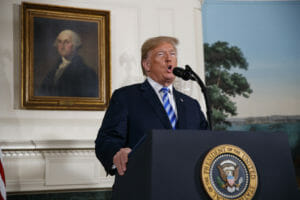Stronger, Please, Mr. President
Having allowed his Republican opponents to dominate the economic debate, Obama used his first news conference to rebut them -- coolly and civilly, yet without leaving any doubt that he can strike back harder if necessary.Having allowed his Republican opponents to dominate the economic debate for two weeks as his stimulus proposal languished, President Obama used his first news conference to rebut them — coolly and civilly, yet without leaving any doubt that he can strike back harder if necessary. He drew the lines that had to be drawn, calling out the opposition’s hypocrisy on spending and identifying conservatives whose answer is to do nothing (except cut taxes for the rich, as always).
For the White House, the strategic issue is whether he waited too long to confront the stimulus critics — and how he will balance bipartisanship with toughness in dealing with the recalcitrant Republicans from now on.
As the debate over the stimulus unfolded, the still mighty conservative propaganda machine incessantly churned out three talking points, encountering very little effective response from the newly empowered progressives:
We should reject the president’s plan because we need tax cuts, they said, not spending. We should reject the president’s plan because the plan is spending, not stimulus. We should reject the president’s plan because the spending will increase the deficit.
And, though this was rarely articulated with any candor, we should reject his plan because government always makes matters worse — and the market will eventually solve the problem of falling demand without intervention.
Replying to questions from reporters, Obama seized the chance to gut each of these arguments in straightforward language. Tax cuts for the nation’s wealthiest citizens won’t solve our economic problems, he said, because “time and time again” the Bush administration followed that course, “and it has only helped lead us to the crisis that we face right now.”
Spending is the main purpose of the stimulus package — indeed, there is no stimulus without spending, as economists of almost every school agree — so the stimulus bill involves spending because “that’s the point.” And as for the politicians now whining about the deficit, their irresponsible stewardship when they controlled Congress left the federal fisc drowned in red.
Making that last thrust regarding the deficit, Obama sharply mocked the sudden rediscovery of fiscal rectitude on the other side. “What I’ve been concerned about is some of the language that’s been used suggesting that this [bill] is full of pork and this is wasteful government spending. First of all, when I hear that from folks who presided over a doubling of the national debt, then I just want them not to engage in some revisionist history. I inherited the deficit that we have right now and the economic crisis that we have right now.” Regarding those duplicitous politicians, he added later, “I’m not sure they have a lot of credibility when it comes to fiscal responsibility.”
Wisely, he also drew an important distinction between Republicans who actually want to engage in constructive dialogue and Republicans who merely want to emit obstructive noise. “I’m happy to get good ideas from across the political spectrum, from Democrats and Republicans. What I won’t do is return to the failed theories of the last eight years that got us into this fix in the first place, because those theories have been tested and they have failed. And that’s part of what the election in November was all about. OK?”
For most Americans, as the overwhelming poll numbers supporting the president indicate, the answer is yes, OK. Most Americans want the 4 million jobs that the president’s proposal is designed to create or preserve. Most Americans agree that government must act. But the president’s hesitancy in rising to the attack since Inauguration Day did not serve him well. The same polls that bolster him show that the Republican talking points about spending and taxes — no matter how illogical or even illiterate — have created doubts even among his supporters.
What can he do about that? Among Obama’s favorite themes is “consistency.” From now on, he and his allies must deliver a strong, consistent message about the role of the public sector — and the bankruptcy of ideological conservatism.
Joe Conason writes for The New York Observer.
© 2009 Creators Syndicate Inc.
Your support matters…Independent journalism is under threat and overshadowed by heavily funded mainstream media.
You can help level the playing field. Become a member.
Your tax-deductible contribution keeps us digging beneath the headlines to give you thought-provoking, investigative reporting and analysis that unearths what's really happening- without compromise.
Give today to support our courageous, independent journalists.






You need to be a supporter to comment.
There are currently no responses to this article.
Be the first to respond.